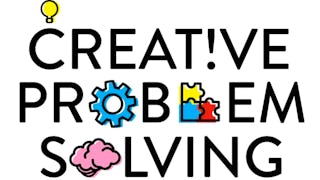- Browse
- Problem Solving
Results for "problem-solving"
 Status: Free TrialFree TrialA
Status: Free TrialFree TrialAArizona State University
Skills you'll gain: Problem Solving, Critical Thinking and Problem Solving, Creative Problem-Solving, Brainstorming, Root Cause Analysis, Analytical Skills, Decision Making, Data Collection, Stakeholder Analysis
4.8·Rating, 4.8 out of 5 stars66 reviewsMixed · Course · 1 - 4 Weeks
 Status: Free TrialFree TrialU
Status: Free TrialFree TrialUUniversity of California, Irvine
Skills you'll gain: Performance Metric, Open Mindset, Team Management, Organizational Strategy, Collaboration
4.6·Rating, 4.6 out of 5 stars7.6K reviewsBeginner · Course · 1 - 4 Weeks
 Status: NewNewStatus: Free TrialFree Trial
Status: NewNewStatus: Free TrialFree TrialSkills you'll gain: Data Structures, Algorithms, Computational Thinking, Programming Principles, Computer Programming, Computer Science
Advanced · Course · 1 - 3 Months
 Status: Free TrialFree Trial
Status: Free TrialFree TrialSkills you'll gain: Problem Solving, Root Cause Analysis, Professional Development, Complex Problem Solving, Collaboration, Critical Thinking, Creative Thinking, Personal Development, Analysis, Agile Project Management
4.6·Rating, 4.6 out of 5 stars746 reviewsBeginner · Course · 1 - 4 Weeks
 Status: PreviewPreviewU
Status: PreviewPreviewUUniversity of Minnesota
Skills you'll gain: Creativity, Creative Thinking, Creative Problem-Solving, Brainstorming, Cognitive flexibility, Persistence, Curiosity, Resourcefulness, Innovation, Problem Solving, Growth Mindedness, Adaptability, Motivational Skills
4.4·Rating, 4.4 out of 5 stars2.4K reviewsMixed · Course · 1 - 4 Weeks
 Status: NewNewStatus: PreviewPreviewS
Status: NewNewStatus: PreviewPreviewSSaïd Business School, University of Oxford
Skills you'll gain: Prioritization, Root Cause Analysis, Critical Thinking and Problem Solving, Complex Problem Solving, Strategic Thinking, Responsible AI, Strategic Leadership, Systems Thinking, Brainstorming, Strategic Decision-Making, Leadership, Initiative and Leadership, Critical Thinking, AI Enablement, Leadership Development, Analysis, Business Solutions, Decision Making, Business Ethics, Artificial Intelligence
4.8·Rating, 4.8 out of 5 stars11 reviewsBeginner · Course · 1 - 4 Weeks
What brings you to Coursera today?
 Status: Free TrialFree Trial
Status: Free TrialFree TrialSkills you'll gain: Excel Formulas, Microsoft Excel, Data Cleansing, Spreadsheet Software, Data Validation, Complex Problem Solving, Data Analysis Software, Data Entry, Data Analysis, Statistical Analysis, Financial Analysis
4.7·Rating, 4.7 out of 5 stars5.5K reviewsBeginner · Course · 1 - 4 Weeks
 Status: Free TrialFree TrialT
Status: Free TrialFree TrialTThe University of Sydney
Skills you'll gain: Creative Problem-Solving, Problem Solving, Creative Thinking, Brainstorming, Analytical Skills, Critical Thinking, Complex Problem Solving, Case Studies, Research, Communication
4.9·Rating, 4.9 out of 5 stars1.7K reviewsBeginner · Course · 1 - 3 Months
 Status: PreviewPreviewU
Status: PreviewPreviewUUniversity of Pennsylvania
Skills you'll gain: Computational Thinking, Algorithms, Program Development, Pseudocode, Problem Solving, Python Programming, Data Structures, Computer Hardware, Computer Programming, Object Oriented Programming (OOP), Analysis, Debugging
4.7·Rating, 4.7 out of 5 stars1.4K reviewsBeginner · Course · 1 - 4 Weeks
 Status: PreviewPreview
Status: PreviewPreviewSkills you'll gain: Algorithms, Technical Communication, Computational Thinking, Solution Design, Programming Principles, Software Design, Theoretical Computer Science, Data Structures, Problem Management, Mathematical Modeling, Computer Science
4.4·Rating, 4.4 out of 5 stars26 reviewsBeginner · Course · 1 - 4 Weeks
 Status: NewNewStatus: PreviewPreview
Status: NewNewStatus: PreviewPreviewSkills you'll gain: Culture Transformation, Process Improvement, Quality Improvement, Systems Thinking, Analysis, Employee Engagement, Data-Driven Decision-Making
Intermediate · Course · 1 - 4 Weeks
 Status: NewNewStatus: PreviewPreviewL
Status: NewNewStatus: PreviewPreviewLLogical Operations
Skills you'll gain: Problem Solving, Critical Thinking and Problem Solving, Creative Problem-Solving, Brainstorming, Creative Thinking, Complex Problem Solving, Team Building, Teamwork, Team Leadership, Solution Selling, Resourcefulness, Business Solutions, Creativity, Collaboration, Analytical Skills, Decision Making, Business Ethics, Strategic Decision-Making, Conflict Management, Analysis
Mixed · Course · 1 - 3 Months
In summary, here are 10 of our most popular problem-solving courses
- Problem-Solving: Arizona State University
- Effective Problem-Solving and Decision-Making: University of California, Irvine
- Advanced Algorithms and Problem-Solving Techniques: Packt
- Solving Problems with Creative and Critical Thinking: IBM
- Creative Problem Solving: University of Minnesota
- Leadership Problem-Solving with AI: Think Like a Leader: Saïd Business School, University of Oxford
- Problem Solving with Excel : PwC
- Problem-Solving Skills for University Success: The University of Sydney
- Computational Thinking for Problem Solving: University of Pennsylvania
- Algorithmic Solutions: Design, Problem Solving, Reporting: Coursera










